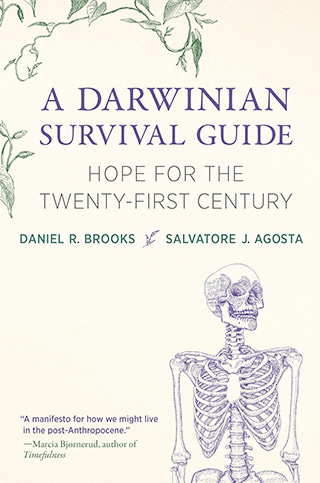🧠Mind Expanding Links 4 Feb 2025
From superintelligent sand-gods to civilisational collapse
Mind Expanding Links is my (cough) *intermittent* roundup of interesting longer reads, deeper thinks and other eclectica that have caught in my net over the last period…
(It’s been quite a while since I put out the last Mind Expanding links roundup…my aim is to get back into a monthly rhythm in 2025 to share these links and I was hoping to get this one out in January … but so much going on with DeepSeek (etc…) in the last week that I missed the deadline as well…🙄)
In this issue:
🌍💥⚠️The Collapse is Coming Peter Watts and Dan Brooks discuss survival adaptation strategies for after the civilisation collapse by 2040-2050
💰Stockholm Syndrome, but for capitalism? increasing positive sentiment towards capitalism over the last century, apparently
👑💸Oligarchic global wealth distribution patterns and power structures
📈📉Dwarkesh Patel X Tyler Cowen will AI's impact on future economic growth be limited or explosive?
🏛️Governing tomorrow a provocation towards new governance frameworks suited for distributed, uncertain futures
⚖️Copyright in the age of AI really good overview of the current legal battles over AI training data … and the stakes being played for
🧪Living intelligence futurist Amy Webb on how combined AI, sensors, and biotech will completely transform business. Your existing AI strategy is out of date already.
🧬Understanding human evolution a new DNA study reveals extensive natural selection in humans over 14,000 years
🎙️Podcasts Another excellent Dwarkesh conversation, this time with physicist Adam Brown discussing mind-bending frontier theoretical physics
📚Books latest book roundup: the TSMC story, evolution theory evolving, nuclear war and the latest tech fiction from Cory Doctorow
☕🧠This week: coffee is good for you (clinging as always for bias-confirming data!) a new study finds coffee consumption improves cognitive function in heart patients
Hopefully something of interest for everyone! As always, please feel free to share things you’re reading that you think Memia’s audience would enjoy too.
🌍💥⚠️The Collapse is coming
From last year: The Collapse Is Coming. Will Humanity Adapt? A dialogue between evolutionary biologist Daniel Brooks — co-author of A Darwinian Survival Guide - Hope for the Twenty-First-Century and sci-fi author Peter Watts (author of the mind-bending Firefall series — absolute must-read first-contact canon) exploring humanity's paths to survival through the impending global collapse predicted around 2040-2050:
“Peter Watts: In this corner, the biosphere. We’ve spent a solid year higher than 1.5 degrees Celsius; we’re wiping out species at a rate of somewhere between 10,000 and 100,000 annually; insect populations are crashing; and we’re losing the West Antarctic Ice Sheet, no matter what we do at this point. Alaskapox has just claimed its first human victim, and there are over 15,000 zoonoses expected to pop up their heads and take a bite out of our asses by the end of the century. And we’re expecting the exhaustion of all arable land around 2050, which is actually kind of moot because studies from institutions as variable as MIT and the University of Melbourne suggest that global civilizational collapse is going to happen starting around 2040 or 2050.
In response to all of this, the last COP was held in a petrostate and was presided over by the CEO of an oil company; the next COP is pretty much the same thing. We’re headed for the cliff, and not only have we not hit the brakes yet, we still have our foot on the gas.“
“Daniel Brooks: Well, the primary thing that we have to understand or internalize is that what we’re dealing with is what is called a no-technological-solution problem. In other words, technology is not going to save us, real or imaginary. We have to change our behavior. If we change our behavior, we have sufficient technology to save ourselves. If we don’t change our behavior, we are unlikely to come up with a magical technological fix to compensate for our bad behavior. This is why Sal and I have adopted a position that we should not be talking about sustainability, but about survival, in terms of humanity’s future. Sustainability has come to mean, what kind of technological fixes can we come up with that will allow us to continue to do business as usual without paying a penalty for it? As evolutionary biologists, we understand that all actions carry biological consequences. We know that relying on indefinite growth or uncontrolled growth is unsustainable in the long term, but that’s the behavior we’re seeing now.“
Brooks’ fatalist position in a nutshell:
Homo sapiens will likely survive as a biological species, but "technological humanity" faces significant challenges to make it through. Preserving valuable aspects of modern civilisation like medicine and technology through the collapse will be essential.
The goal is to shorten the recovery period after collapse from potentially thousands of years to perhaps a single generation, by making strategic preparations and behavioural changes now rather than trying to prevent the inevitable collapse itself.
The “survival guide” strategy focuses on:
Working around rather than confronting existing power structures
Developing small, local, self-sufficient communities
Redistributing populations away from climate-insecure megacities
Embracing evolutionary principles of adaptation and variation
He also challenges neo-protectionist views about separating humans from nature, arguing that human-environment interaction is natural and necessary.
Once again, my mind races at the juxtaposition between “shorten the recovery period after technological collapse from potentially thousands of years…” and the current “multi-trillion dollar race to build a superintelligent sand-god” … I have no idea which one will turn out to be correct but I’m here for the ride...
💰Stockholm Syndrome, but for capitalism?
A research team from Boston University has published a comprehensive AI analysis of 400,000 newspaper articles spanning decades, revealing a growing positivity towards capitalism over time.
Keep reading with a 7-day free trial
Subscribe to Memia to keep reading this post and get 7 days of free access to the full post archives.






